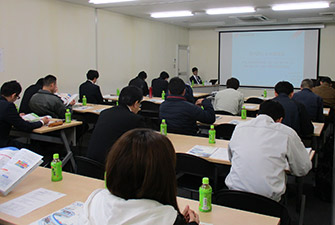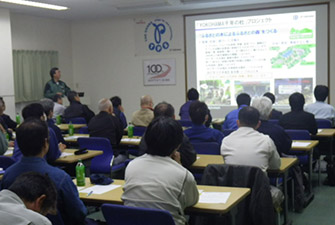KPI
-
Item
Ratio of new suppliers that business was commenced with after conducting a human rights assessment
-
FY 2016 results
(Consolidated) 100%
-
FY 2017 results
(Consolidated) 100%
Item
Number of suppliers identified with a negative impact on human rights after conducting a CSR self-diagnosis and detailed analysis
FY 2016 results
―
FY 2017 results
Zero
We requested suppliers to conduct a CSR self-diagnosis, and conducted a more detailed analysis on the response to human rights.
No specific suppliers were identified to have negative impacts on human rights
Responsible Departments
Indirect Materials Procurement Department, Raw Materials Procurement Department, Global Procurement Division
Stance and Target
Why is “Supplier Human Rights Assessment” a critical issue to be addressed?
Explanation of the reason and background
Yokohama Rubber Group's products use natural resources that include natural rubber, fats, oil, and minerals, as well as industrial products and processed goods. For this reason, the risk of human rights issues in some regions cannot be denied as we promote local procurement accompanying the global expansion of the supply chain and the expansion of overseas business locations, and in order to ensure stable and ethical procurement in the future we recognize conducting labor practices assessments on the people who work in the development and collection of human resources and the manufacturing of industrial products and processed goods as an important issue.
Policies and stance relating to human rights assessments of suppliers
Under Yokohama Rubber's Basic Procurement Policy and the Yokohama Rubber Group Action Guidelines, it stipulates that we should work towards fair business practices and conduct procurement activities that take the human rights of the employees of suppliers into consideration.
Labor practices assessment at the start of new business relationships
We conduct CSR questionnaires and request answers to questions concerning human rights to confirm that there are no issues.
Recognition of the impact of human rights in the supply chain
We recognize that in some countries and regions where our business locations are located there may be cases of people coming to work from other countries and regions, and for this reason there is the possibility of acts or treatment that damage human rights occurring.
Countermeasures in response to suppliers found to have a significant impact
We request that corrective action is taken by suppliers that are found to have a significant impact.
In malicious cases, we notify suppliers of penalties such as limitations on some transactions and respond according to the situation.
Vision (attainment goal) / target
We aim for the creation of a framework that ensures assessments are conducted in every case of procurement of local raw materials at the time of industry reorganization or expansion into new countries and regions so that contracts are entered after confirming local conditions so that there is no damage to human rights in our supply chain.
Measures for vision achievement
We will check that our employees are reliably conducting assessments of new suppliers in accordance with the action guidelines and purchasing code of conduct.
Review of FY 2017 Activities
Each of our business sites hosted CSR study meetings for suppliers and study sessions on outsourcing guidelines for persons in charge at Yokohama Rubber.
CSR study sessions were held at seven business locations, with a total of 311 suppliers participating.
Discussions were held during study sessions, while CSR surveys and visiting audits of suppliers were also conducted, but there were no cases requiring improvement by suppliers.
Study sessions on outsourcing guidelines are held to educate Yokohama Rubber Group employees about the Act against Delay in Payment of Subcontract Proceeds, Etc. to Subcontractors and prevent legal violations.
Speakers (attorneys) were sent from the Small and Medium Enterprise Agency to each business site, giving presentations at three locations.
A total of 192 employees attended, including employees of Yokohama Group Companies.

Onomichi

Shinshiro
Introduction of Initiatives
At CSR workshops, we requested suppliers to make efforts to monitor and rectify human rights and labor issues, which includes not only their own company, but also their subsidiaries and suppliers.
In addition, we initiated investigations based on the questionnaire whose content we reviewed.
Issues and Future Improvement Measures
We will continue to create opportunities to share and study together the challenges faced by suppliers.
We also analyze the results of questionnaires targeting suppliers, and consider countermeasures.

